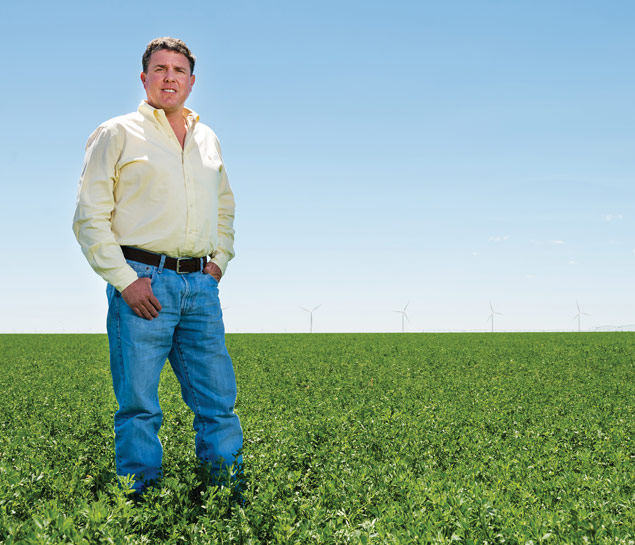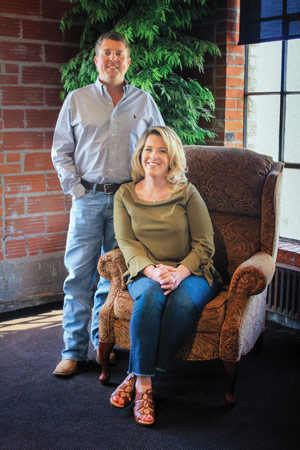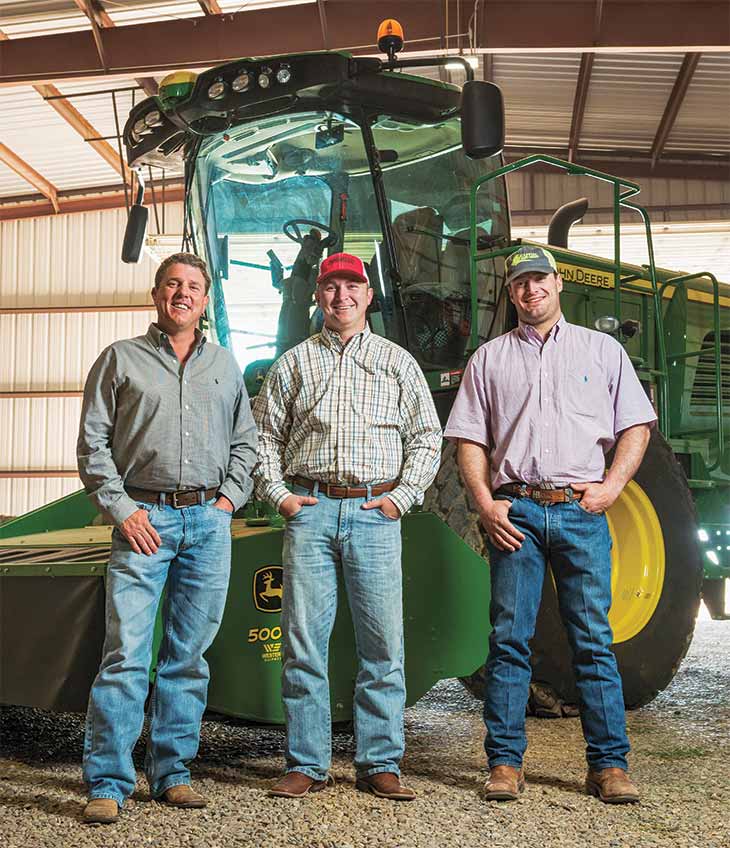Wade Alexander couldn’t wait to leave the Levelland, Texas, cotton farm where he grew up. He respected the work both of his grandfathers did, but decided early on that it wasn’t for him.

Photo by Shannon Richardson
Wade Alexander and his wife, Karen, bought her grandfather’s cotton farm, where they now grow alfalfa.
And yet later, he and his wife, Karen, bought a cotton farm.
It wasn’t just any cotton farm, however. The land had been in Karen’s family for 110 years — since her great-great-grandfather sold everything he owned in Ohio, chartered a railroad car and moved his family to Carson County, Texas.
Buying the farm was a no-brainer, an opportunity to carry on a legacy and one day pass it down to their own children.
But what would the Alexanders do with the property, since Wade didn’t want to be a cotton farmer?
Happenstance Leads to Hay
A chance meeting with Karen’s uncle, an alfalfa farmer, changed everything.
“I ran into him one day at a restaurant,” Wade says. “We just got to talking and catching up. He’d heard we had bought the land and asked what we were going to do with it.”
“They were bold enough to take a cotton and grain operation and decide that instead of riding the cycles and going through the pains and the constant beatings from the traditional commodity markets, they would re-evaluate their entire business model.”
- Lance Weaver, Capital Farm Credit
The uncle encouraged Wade to consider growing alfalfa, pointing out the area’s almost-perfect climate and conditions for the crop, as well as a booming market.
Karen said they were quickly sold on the idea, due to her uncle’s expertise.
“He’s been in the alfalfa business for years,” Karen says. “And he grew up on that land. He knew the dirt that was there, and he knew the water that was there. He said it was ideal, and he was right: Our first crop was beautiful.”
Bigger Isn’t Always Better
Operating their hay business under the name Standard Hay, Wade and Karen decided immediately that they’d only grow and sell small square bales. They would focus on quality and strive to meet the high standards of the most discriminating horse owners. Today, they’re even in the process of trademarking their finest line of premium hay, which they’ve branded Blue String.

Photo by Katrina Huffstutler
Wade and Karen Alexander
For this market, size matters — but not in the way you might think.
“Most alfalfa growers grow three-string bales,” Wade explains. “They weigh about 100 pounds, which is huge. Those bales aren’t easy to handle.”
With his small 58-pound bales, he’s able to fill a very specific niche. A bonus? He says it takes them out of the commodities market.
“The ups and downs of the NYMEX, the Chicago Board of Trade — we don’t have to worry about what’s going on in China or Brazil or anywhere else,” Wade says.
The only downside?
“I wish it was summer year-round,” he says with a laugh.
Growing, Growing, Gone
A year and a half ago, Standard Hay had only one customer, albeit a large one — Karen’s same uncle who encouraged them to get into the business. But soon they were growing more hay than he could buy, so they set up dealers across the state. This past February, the couple opened a retail location in Weatherford, Texas, the heart of cutting-horse country, and they plan to open at least three more retail locations this year — in Decatur, Gainesville and the Dallas–Fort Worth metroplex.
“We’re fully integrated now,” Wade says. “We grow it, we bale it, we do everything ourselves. We sell it ourselves.”
Their unique setup allows for unique marketing opportunities.
“Most people have to go through a hay dealer,” Karen says, “so the buyer never knows where their hay comes from. But we allow people to come out to the fields and see it for themselves. They can even buy a crop before it is baled, if that’s what they want to do.”
Wade says that while it’s relatively easy to produce a good product, today there’s more to satisfying customers than just providing the product.

Photo by Shannon Richardson
Pictured from left to right are Wade Alexander, Lance Weaver of Capital Farm Credit and Hunter Bevill, the Alexanders’ farm manager.
“I really believe that we’re going back to my grandparents’ days,” he says. “Days where service, relationships and loyalty really mean something. People are over the Walmart mentality. If we’ve got a guy who is going to pay us $12 for a bale of hay, we’re going to load it in his truck, shake his hand and say thank you. We want our customers to know how much we truly appreciate their business.”
Streamlining Their Business
Wade and Karen are humble and gracious despite their impressive success, but Lance Weaver, vice president and Pampa branch manager for Capital Farm Credit, is quick to brag on the couple — their talents, work ethic and unique perspectives.
“They were bold enough to take a cotton and grain operation and decide that instead of riding the cycles and going through the pains and the constant beatings from the traditional commodity markets, they would re-evaluate their entire business model,” Weaver says. “Not just what they were growing, but how they were growing it, and how they were getting it done in the field.”
He notes that an alfalfa business is different than a grain operation in a number of ways, and the Alexanders have structured it accordingly.
“Alfalfa is a semi-permanent crop,” Weaver explains. “It is going to be in the ground 10 to 15 years. They’ve staggered their plantings to where they’re not replanting all the crop at once.”
They’ve also taken a different view of machinery needs, with some help from Farm Credit Leasing.
“Wade is a pioneer in that way,” Weaver says. “He started leasing equipment instead of using old machinery that takes a lot of money to maintain. He wants to pay as little as possible, because it’s going to be sitting a lot of the time. And then he will roll it out when it starts costing too much money.”
Because of that, Weaver explains, Standard Hay has been able to maintain a long-term outlook, streamline cash flows, build net worth at a faster pace than normal and grow the business rapidly.
Marketing Savvy
Wade and Karen’s marketing skills are a great help, too.
“They’re incredible marketers,” Weaver says. “Wade has a real gift for marketing. He’s built several big businesses. You combine their skills and unique view of the marketplace with the changing world of agriculture, and this is a really cool thing to be a part of.”
For as much good as their loan officer has to say about them, the Alexanders feel the same about him and the services Capital Farm Credit and Farm Credit Leasing provide.
“Lance is a true partner. If it wasn’t for him and Capital Farm Credit, we wouldn’t be doing this today,” Wade says. “There’s no way. There’s no one who could’ve seen the vision that we saw. If you’re a farmer and you’re not doing business with Capital Farm Credit, you’re with the wrong people. And that’s just all there is to it.”
– Katrina Huffstutler